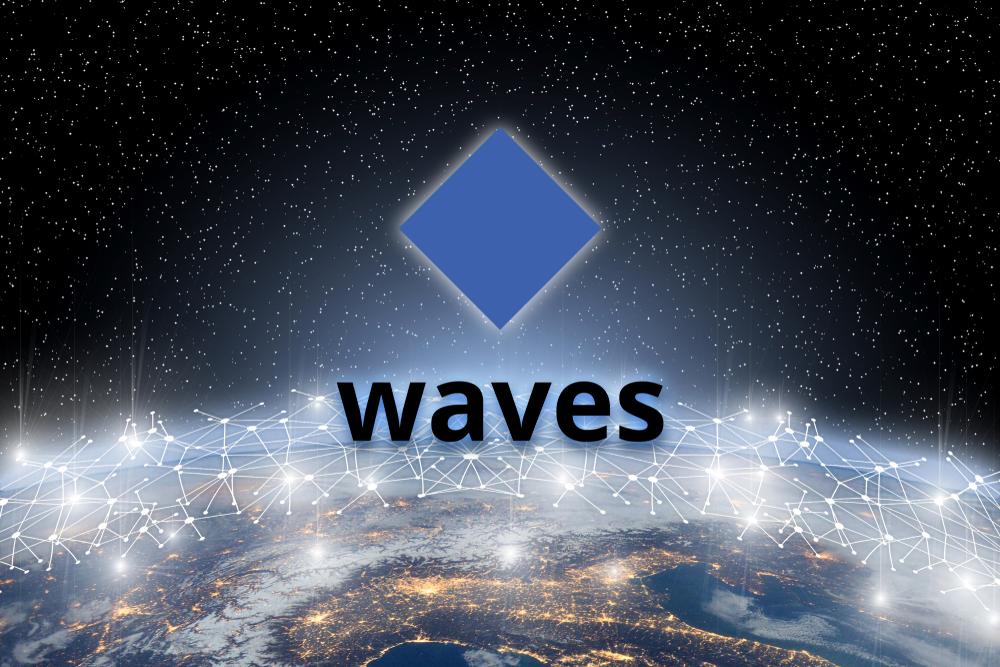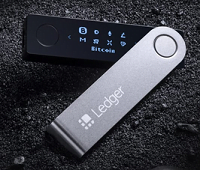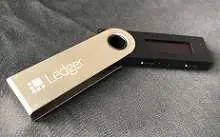If you are looking for a wallet for the cryptocurrency Waves, then you have come to the right place. We introduce you to the safest and best Waves wallets in detail. Waves hardware wallets offer the strongest protection, but they come at a cost. That’s why we also introduce free Waves desktop wallets, which provide good security and an intuitive user interface.
First, however, it is important that you have a basic understanding of cryptocurrencies and wallets. Therefore, we would like to give you a short theoretical introduction to the different types of wallets. If you already know your way around, feel free to skip this part.
A crypto wallet is a digital tool that, unlike traditional wallets, does not store the cryptocurrency itself but rather the private keys that grant access to it. Depending on whether these keys are stored online or offline, wallets are categorized into two main types:
- Cold wallets
- Hot wallets
These two types differ significantly in one key aspect: their connection to the internet. Cold wallets keep private keys completely offline, ensuring they are never exposed to online threats. This makes it nearly impossible for hackers to steal your private keys and gain access to your Waves holdings.
In contrast, hot wallets store private keys on internet-connected devices, meaning the keys are at least temporarily exposed online. This increases the risk of potential hacking attempts and unauthorized access.
Because of this fundamental difference, major crypto investment firms store their customers’ funds in cold wallets to prevent cyber threats. We strongly recommend investing in a Waves hardware wallet, as it offers the highest level of security. Alternatively, you can create a free Waves paper wallet, where you print your private key, password, and wallet address on a physical document. This is a good option if you don’t need frequent access to your Waves assets.
Hot wallets can be further divided into three categories, based on the medium in which private keys are stored:
- Waves Desktop Wallets
- Waves Mobile Wallets
- Waves Web Wallets
The private key acts as the ultimate proof of ownership and access to the cryptocurrency. Meanwhile, the public key is derived from the private key and is used to generate a wallet address (a hashed version of the public key). Unlike a public wallet address, which can be shared freely, the private key should never be disclosed to anyone. Anyone who possesses the private key can access and control the associated Waves funds.
The best Waves hardware wallets
Hardware wallets are the best and safest way to store your Waves. Hardware wallets offer the highest security standard and the big advantage that several cryptocurrencies are supported in addition to Waves. Furthermore, the manufacturers of the hardware wallets issue regular updates so that you are always up to date with the latest security standards.
The private keys of hardware wallets are stored in a separate partition. Even when a transaction is released, the private key never leaves the wallet or is in contact with the Internet. By that, the architecture of the hardware wallet provides a powerful protection for your keys. Hackers have practically no point of attack to gain access to your private keys.
However, hardware wallets do not only provide online protection. Even if your Waves hardware wallet is stolen, you can set up a PIN and 2-factor authentication beforehand. The thieves have to overcome these two barriers in order to get access to your Waves.
Overall, Waves hardware wallets offer the best possible protection currently available on the market. Therefore, in our opinion, every penny invested in a hardware wallet is worth it and protects your capital from robbers, malware, and hackers.
We have listed all advantages and disadvantages of Waves hardware wallets for you:
✅ Your private keys will be stored offline
✅ More than 1,250 different cryptocurrencies are supported (Ledger)
✅ Each transaction must be confirmed manually at the touch of a button.
✅ You receive the latest security updates on a regular basis.
✅ If you have any questions, the very good customer support can be contacted
❌ No deposit insurance, as with eToro
1.Ledger Nano X hardware wallet
We have tested a total of 8 different hardware wallets and found a test winner: The Ledger Nano X. It is the successor of the Ledger Nano S and offers numerous new functions. The biggest innovation is the integrated Bluetooth function, whereby the Ledger Nano X can be used with your smartphone and functions as a mobile wallet while offering the security of a hardware wallet.
Furthermore, the security of the wallet was increased, and a new security chip was installed. The internal memory has also been increased so that up to 100 apps can now be stored and used simultaneously. Also cool is that the display is larger, and wallet addresses can be checked on the display without scrolling.
Bottom line: In our opinion, there is no better Waves hardware wallet at the moment that offers this level of security and functionality for the same price. We can therefore warmly recommend the Ledger Nano X to you.
2.Ledger Nano S
Ledger’s first hardware wallet, the Nano S, has sold more than 1.3 million copies worldwide, showcasing its strong security and quality. We have used the Ledger Nano S for several years and are completely satisfied with it. To date, there are no documented hacker attacks where cryptocurrencies were stolen.
Another advantage of the Nano S is its low price – currently 59€. If you don’t need the new features of the Nano X, then the Ledger Nano S is the perfect Waves hardware wallet for you.
The best Waves desktop and mobile Wallets
Both desktop and mobile wallets belong to the hot wallet category, as your smartphone and PC are temporarily connected to the Internet. This brings the private keys into contact with the World Wide Web. However, both desktop and mobile wallets provide significantly better security than web wallets. The private keys are not stored on a central server or in the browser but are securely held on the device you are using.
Security should be a top priority when managing cryptocurrencies. While desktop and mobile wallets offer better protection than web wallets, they still require users to take proactive steps to safeguard their assets. Using strong passwords, enabling two-factor authentication, and regularly updating software are essential practices to prevent unauthorized access. Additionally, being cautious about malware and phishing attempts is crucial, as hackers often target users of hot wallets through deceptive tactics.
The big advantage of mobile Waves wallets, as well as desktop wallets, is that they can be used free of charge. So there are no acquisition costs for the purchase, as with hardware wallets. The following overview shows you the advantages and disadvantages of Waves desktop and mobile wallets:
✅ You can access your Waves from anywhere with an Internet connection.
✅ Significantly better security than with a web wallet
✅ Securing the wallet with a password and a 2-factor authentication
✅ Multi-coin wallets support over 100 cryptocurrencies
❌ Good security, but worse than hardware wallets
❌ It is your own responsibility to install updates regularly.
❌ There is no deposit insurance as some brokers offer (e.g. eToro).
In the following, we present the best Waves wallet for serious desktop and mobile Waves wallets:
- Waves Official Desktop and Web Wallet
- Trust Wallet
- Atomic Wallet
- Exodus Wallet
1. Waves Official Desktop and Web Wallet

The Waves web wallet is also available as a desktop version and offers a direct connection to the decentralized exchange Waves DEX. This decentralized exchange offers trading for BTC, ETH, LTC, XRP, and several other crypto and fiat currencies. The charts are provided via the TradingView API.
The trading fees on the DEX are very low compared to centralized exchanges such as eToro or Binance. The wallet does not have to be set up, as a simple registration on the official website of the exchange is sufficient. Waves recommends using the desktop wallet as this version is more secure than the web wallet.
The private keys are stored on your PC when using the desktop wallet. This way, nobody but you has access to the private keys. Both the desktop and the web versions of the wallet are simple and clearly structured. However, operating the exchange can be somewhat complicated for beginners and requires some training. The wallet is also available in several languages (DE, EN, FR, ES).
We recommend that you use the Waves desktop wallet if you do not want to purchase a hardware wallet. This gives you the best possible protection with a free Waves wallet. You can register or download an account and the wallet on this page.
Since your smartphone and PC are likely connected to the Internet, you should install up-to-date antivirus software and ensure your device is free of malware. Hackers can try to steal your private keys via a Trojan or track your password via keyloggers. Therefore, using security software on your smartphone or PC is necessary and important.
If you are looking for a desktop wallet with an integrated exchange, we recommend using the official Waves wallet. If you want to use a multi-coin wallet to store multiple cryptocurrencies, consider the Atomic Wallet or the Trust Wallet.
Waves Online Wallets
Online wallets offer an easy and reliable way to store your Waves. The best-known online wallets are exchange wallets. By using them, you completely hand over the responsibility for managing your private keys to the exchange and must trust it to secure them properly.
It is vital to understand the risks of using exchange wallets. While they provide convenience and accessibility, they also mean that you do not have direct control over your assets. If an exchange experiences a security breach, insolvency, or regulatory shutdown, your funds could be lost with little to no recourse. This is a significant trade-off between ease of use and security.
Exchange wallets offer good protection and often allow an additional security layer in the form of two-factor authentication. However, exchanges have frequently been targeted by hackers in the past, resulting in millions of stolen cryptocurrencies, with victims rarely compensated.
The key advantage of exchange wallets is their ability to facilitate active cryptocurrency trading, along with a simple setup process. Typically, registering an account with the exchange is sufficient. However, in some cases, personal information may be required (under KYC and anti-money laundering regulations).
For long-term storage of Waves or other cryptocurrencies, a non-custodial wallet is highly recommended. Hardware wallets, desktop wallets, or even mobile wallets where you control your private keys provide much better security. If you choose to use an exchange wallet, ensure that you enable all available security features and never leave large amounts of cryptocurrency stored there for an extended period.
In the table below, we have compiled the advantages and disadvantages of Waves online wallets:
✅ Direct trading within the wallet
✅ No installation required; simple registration
✅ Ability to set upper payout limits
✅ Good customer support and an intuitive user interface
✅ Supports multiple cryptocurrencies besides Waves
❌ No access to private keys
❌ Higher risk of hacking or phishing attacks
❌ Some platforms have turned out to be scams
- Waves Online Web Wallet
- Binance
- Bitpanda
- Waves Wallet Light Client
1. Waves Online Web Wallet

The already introduced Waves desktop wallet is also available as a web wallet, connected to the decentralized exchange Waves DEX. Users can trade cryptocurrencies such as BTC, ETH, LTC, and XRP, along with other digital and fiat currencies.
The use of the exchange is free, with fees only applied for trading and transactions. Registration is fast and requires no personal data, allowing for anonymous use. However, users do not have access to their private keys, meaning security is entirely dependent on the exchange.
It is crucial to understand the risks associated with using an online wallet. While the Waves web wallet provides convenience and quick access, it also means entrusting your private keys to the exchange. If the exchange experiences a security breach or an unexpected shutdown, users may lose access to their funds. Unlike hardware or desktop wallets, where you control your private keys, web wallets require a higher level of trust in third parties.
For those who prioritize security, we strongly recommend using the desktop version of the Waves wallet or a hardware wallet. These options provide direct ownership and control over your assets, significantly reducing the risk of cyber threats. While web wallets are an excellent tool for quick trading and accessibility, long-term storage should always be conducted through more secure methods.
To create an account, visit this page.
Important Information About the Waves Wallet Test
We have compiled this information to the best of our knowledge through our own testing and extensive research. However, you should explore and try different wallets to find the best one for your needs.
If you have any questions, suggestions, or feedback regarding our Waves wallet review, please leave a comment. We’d love to help. Additionally, if you found this review helpful, please rate our post by clicking on the stars at the end of this article.
Your opinion matters! We strive to provide the most accurate and up-to-date information, but the world of cryptocurrency is constantly evolving. Your experiences and insights can help improve our content and guide others in choosing the best Waves wallet. If you have tested any of the wallets mentioned or have discovered new security features, feel free to share your thoughts. We appreciate your engagement and value your feedback!
[ratings]




